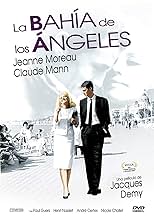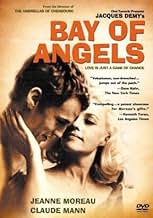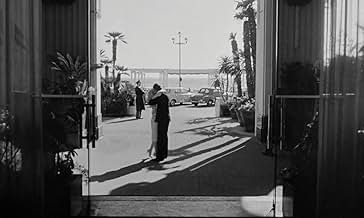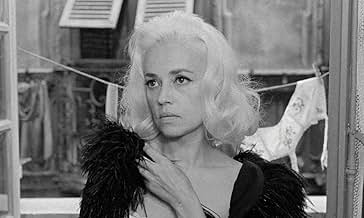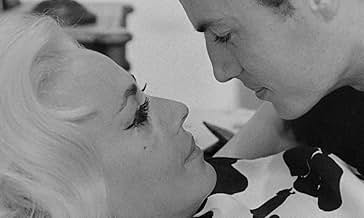IMDb-BEWERTUNG
7,2/10
4560
IHRE BEWERTUNG
Füge eine Handlung in deiner Sprache hinzuJean is a clerk in a bank. His colleague Caron is a gambler and gives him the virus. In the casinos, Jean meets Jackie. Their love affair will follow their luck at the roulette.Jean is a clerk in a bank. His colleague Caron is a gambler and gives him the virus. In the casinos, Jean meets Jackie. Their love affair will follow their luck at the roulette.Jean is a clerk in a bank. His colleague Caron is a gambler and gives him the virus. In the casinos, Jean meets Jackie. Their love affair will follow their luck at the roulette.
- Auszeichnungen
- 1 wins total
Empfohlene Bewertungen
First a note of interest: Jeanne Moreau is in the movie, and she's the star, of course, but she's also a blonde here. Usually, from what I can remember from say The Lovers or La Notte or Jules & Jim it's dark or at least brunette. I wonder if she was already blonde at the time or if it was a deliberate and specific choice on director Jacques Demy's end. Because, somehow, it does add something extra to the character. When we first see her on screen she's being 'escorted' (kind word for kicked out) of a casino that Jean and Caron are at to start gambling, and it's a big scene where we see her arguing and stomping her feet and we barely see her face, just a fury of big blonde hair and attitude to match. It's not exactly the same cool presence one saw in some of Moreau's other big films of the period - and yet when we see her again she is lovely and with that face that charms immediately upon the smile, and makes one feel the gloom of after hours when looking serious.
Bay of Angels is a movie that works best when Demy focuses his theme on escapism, what would appear to be at first a film for escapists, about people going off to rich places like Monte Carlo and gambling away the life savings and having a great time in expensive suits and drinking champagne. But it's also about the nature of this escapism, the danger of it. It's predictable to see that Jean, who comes from a family where gambling is incredibly frowned upon, and Jackie, who at one point confesses that going into a casino is like going into Church, will lose a lot of money, maybe all of it, and keep going in dire straits throughout. What isn't expected is how Demy interweaves this seemingly endless back and forth of the bottomless pit that is a gambler's life (if only seeming like a lifetime in however few days Jean/Jackie are together) and how touching it becomes against the backdrop of glamour. At the least, his film is about something.
The only problems come with a few scenes in the script that drag - the dialog often works, but sometimes not quite enough to satisfy the emotional purpose of a scene. Maybe also contributing to this is first time actor Claude Mann as Jean. Mann would later be featured in Melville's Army of Shadows, among other notable films, but here he just can't hold his own most of the time alongside such a presence like Moreau. It was wise to cast someone young, and maybe not with the most experience, as this kid who goes on vacation from a small bank-clerk job to try and find himself by way of throwing away hundreds of thousands (albeit I pictured more-so, as the film went on, the actor who played the lead in Pickpocket). But Mann just doesn't really fit in, especially when he has to go into big dramatic scenes (i.e. the outbursts of anger against Jackie in the hotel rooms).
And yet Bay of Angels displays a director with an intuition with the camera, a grace and style, and a dazzling sense of music, precisely repetitive, over the shots of the roulette table spinning around and the faces dissolving in and out with it. There are beautiful moments, and it's hard not to take eyes ever off of Moreau, one of those actresses who keeps working today into her late 70s going on 80s but whom one thinks of in black and white only. She had/has one of the great faces in movies, and she's a damn good actress to boot. 7.5/10
Bay of Angels is a movie that works best when Demy focuses his theme on escapism, what would appear to be at first a film for escapists, about people going off to rich places like Monte Carlo and gambling away the life savings and having a great time in expensive suits and drinking champagne. But it's also about the nature of this escapism, the danger of it. It's predictable to see that Jean, who comes from a family where gambling is incredibly frowned upon, and Jackie, who at one point confesses that going into a casino is like going into Church, will lose a lot of money, maybe all of it, and keep going in dire straits throughout. What isn't expected is how Demy interweaves this seemingly endless back and forth of the bottomless pit that is a gambler's life (if only seeming like a lifetime in however few days Jean/Jackie are together) and how touching it becomes against the backdrop of glamour. At the least, his film is about something.
The only problems come with a few scenes in the script that drag - the dialog often works, but sometimes not quite enough to satisfy the emotional purpose of a scene. Maybe also contributing to this is first time actor Claude Mann as Jean. Mann would later be featured in Melville's Army of Shadows, among other notable films, but here he just can't hold his own most of the time alongside such a presence like Moreau. It was wise to cast someone young, and maybe not with the most experience, as this kid who goes on vacation from a small bank-clerk job to try and find himself by way of throwing away hundreds of thousands (albeit I pictured more-so, as the film went on, the actor who played the lead in Pickpocket). But Mann just doesn't really fit in, especially when he has to go into big dramatic scenes (i.e. the outbursts of anger against Jackie in the hotel rooms).
And yet Bay of Angels displays a director with an intuition with the camera, a grace and style, and a dazzling sense of music, precisely repetitive, over the shots of the roulette table spinning around and the faces dissolving in and out with it. There are beautiful moments, and it's hard not to take eyes ever off of Moreau, one of those actresses who keeps working today into her late 70s going on 80s but whom one thinks of in black and white only. She had/has one of the great faces in movies, and she's a damn good actress to boot. 7.5/10
This is a kind of interesting film. It has been overshadowed by later, greater works by Jacques Demy, such as Les Parapluies de Cherbourg, but at its heart it has pretty much the same themes - the difficulties of translating American modernity into French provincial life. Moreau has an unusual turn as an Americanised film star, complete with bleached blonde hair -do a la Marilyn Monroe, playing Jackie, a gambler on the Cote d'Azur. Jean, on holiday from his strict father, falls in love with her. This slight plot (that really is it!)is the background for meditations on chance, love, luck, and life. There are some virtuoso cinematic moments, such as Jackie running toward Jean being glimpsed in mirrors at the end of the film. The overpowering score is slightly grating, but all in all it's a charming period piece.
Jacques Demy's second feature is an amazingly fluid, vibrant comedy about love and luck, starring Jeanne Moreau at her (dazzling) best. And she is literally dazzling, in resplendent costumes (mostly by Pierre Cardin) and radiantly blonde. The music by Michel Legrand is one of his best scores ever, as it sweeps through the film, carrying everything along with two basic themes, one furiously accelerated piano theme, the other a softer, more lilting theme played in different variations, but mostly on the mandolin. It's a movie that sweeps you along, just as fast and unpredictable as a spin on the roulette wheel. This is a film in which "black-and-white" becomes a dazzling metaphor, so that the sun-drenched exteriors of the south of France are contrasted with the various interiors of hotel rooms and casinos. LA BAIE DES ANGES may seem slight, but only "seems": it's one of the most passionate statements on love and faith in the modern cinema, and it's a work of true enchantment.
Boy, take Demy away from musicals and he becomes one rather somber director, huh? In other words, I disagree with the previous reviewer, theognis 80821, who described this very bleak study of two chronic gamblers as "fun". In fact, it's so un fun that I sedulously did not buy the tacked on happy ending when Jeanne Moreau's walking ad for gamblers anonymous suddenly and inexplicably decides to renounce roulette for stolid Claude Mann (who may look like Belmondo but does not resemble his acting).
However, until that cloying last scene Demy does not hit a false note as he relentlessly chronicles the toll this insidious addiction takes on a woman of intelligence and sensitivity to the point where husband and child are tragically renounced for momentary highs at expensive and tawdry casinos. And Moreau's great performance ensures that you experience the full ugliness of it. Give it a B plus which would have been higher without that sappy ending and a different actor in the lead opposite Ms. Moreau.
However, until that cloying last scene Demy does not hit a false note as he relentlessly chronicles the toll this insidious addiction takes on a woman of intelligence and sensitivity to the point where husband and child are tragically renounced for momentary highs at expensive and tawdry casinos. And Moreau's great performance ensures that you experience the full ugliness of it. Give it a B plus which would have been higher without that sappy ending and a different actor in the lead opposite Ms. Moreau.
Although it may not go down too well with Jacques Demy devotees who enjoy seeing his characters burst into song, I consider this to be his most accomplished work. Not only is it close to perfection and technically flawless, no other film has managed to capture so well the agony and ecstasy of gambling.
Jean is introduced by a friend to the roulette tables in Nice and gets the bug. Initially he exercises great self-contol and quits when he's ahead but all that changes when he meets an addictive gambler named Jacqueline. They become lovers and the high and lows they experience in the casino are reflected in their relationship. Here Jeanne Moreau, one of the greatest of French actresses, complete with dyed blonde hair, cigarette holder and outfits from Pierre Cardin, is utterly riveting as Jacqueline and is perfectly complemented by Claude Mann whose first film this is. Excellent script by Demy although by all accounts he had little experience of gambling. Camerawork, editing and production design are exemplary. Unsurprisingly the score is by Michel Legrand whose partnership with Demy is one of cinema's most rewarding.
The gambler's life with its cycles of euphoria and despair and its dramatic fluctuations of luck, is very often frowned upon. Demy does not stoop to moralising but simply presents gambling as a metaphor for living. What this tender, bittersweet and entertaining piece does is to remind us that in the world of the gambler one law reigns supreme:THE HOUSE ALWAYS WINS.
Jean is introduced by a friend to the roulette tables in Nice and gets the bug. Initially he exercises great self-contol and quits when he's ahead but all that changes when he meets an addictive gambler named Jacqueline. They become lovers and the high and lows they experience in the casino are reflected in their relationship. Here Jeanne Moreau, one of the greatest of French actresses, complete with dyed blonde hair, cigarette holder and outfits from Pierre Cardin, is utterly riveting as Jacqueline and is perfectly complemented by Claude Mann whose first film this is. Excellent script by Demy although by all accounts he had little experience of gambling. Camerawork, editing and production design are exemplary. Unsurprisingly the score is by Michel Legrand whose partnership with Demy is one of cinema's most rewarding.
The gambler's life with its cycles of euphoria and despair and its dramatic fluctuations of luck, is very often frowned upon. Demy does not stoop to moralising but simply presents gambling as a metaphor for living. What this tender, bittersweet and entertaining piece does is to remind us that in the world of the gambler one law reigns supreme:THE HOUSE ALWAYS WINS.
Wusstest du schon
- WissenswertesAccording to Agnès Varda, Jacques Demy had little to no experience gambling prior to making this film. Although another source states Demy decided to make the movie after winning a large bet placed on the number 17. Jackie's lucky number is also 17.
- Zitate
[English subtitled version]
Jean Fournier: I've been the studious, mild-mannered boy up until now. That's over now. I need something else.
- VerbindungenFeatured in Jacquot de Nantes (1991)
Top-Auswahl
Melde dich zum Bewerten an und greife auf die Watchlist für personalisierte Empfehlungen zu.
- How long is Bay of Angels?Powered by Alexa
Details
- Erscheinungsdatum
- Herkunftsländer
- Offizieller Standort
- Sprache
- Auch bekannt als
- Bay of Angels
- Drehorte
- Produktionsfirma
- Weitere beteiligte Unternehmen bei IMDbPro anzeigen
Box Office
- Bruttoertrag in den USA und Kanada
- 85.840 $
- Weltweiter Bruttoertrag
- 85.840 $
- Laufzeit1 Stunde 30 Minuten
- Farbe
- Sound-Mix
Zu dieser Seite beitragen
Bearbeitung vorschlagen oder fehlenden Inhalt hinzufügen

Oberste Lücke
By what name was Die blonde Sünderin (1963) officially released in India in English?
Antwort
